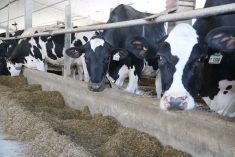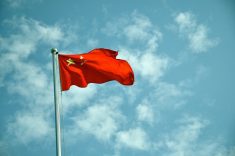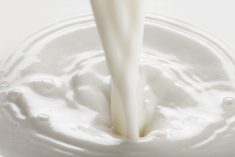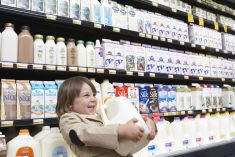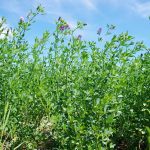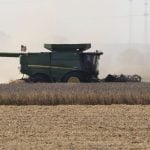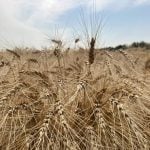The process to set the next national price adjustment for Canadian milk will now take an extra week, triggered by stakeholder objections, for a round of consultations — in which the national dairy farmer group plans to call for a delay on any increase.
The Canadian Dairy Commission — the Crown corporation managing Canada’s milk supply — on Oct. 6 published the results of its Cost of Production survey, as a precursor to setting the annual milk price adjustment due to take effect Feb. 1, 2024.
The commission pegged the 2023 indexed Cost of Production (iCOP) at $93.09 per standard hectolitre, down 1.43 per cent from $94.44 in 2022, but marked the consumer price index (CPI) at 155.4, up 4.98 per cent from the 2022 level of 148.
Read Also

Ample supplies and improved livestock sector to boost Canadian feed sector: FCC
Abundant feed grain supplies and improved profitability for the livestock sector should support strong feed demand and sales through the winter, says a new report from Farm Credit Canada.
The commission’s national pricing formula (NPF) is based on 50 per cent of the annual change in iCOP and 50 per cent of the change in the CPI, which in this case would result in an increase of 1.7736 per cent effective Feb. 1, 2024 — although the commission said that figure “is not necessarily equivalent to the next price adjustment.”
READ MORE: Farm-gate milk price increase predictable, says economist
The commission had given stakeholder groups until Friday (Oct. 13) to declare if they wish to invoke the “exceptional circumstances” process — which in turn triggers an additional discussion period with those groups but won’t necessarily lead to a change in the price adjustment.
The participating stakeholder groups include Dairy Farmers of Canada (DFC) as well as the Canadian Federation of Independent Grocers (CFIG), Dairy Processors of Canada, Retail Council of Canada, Restaurants Canada and Consumer Association of Canada.
With two out of three criteria met for invoking the exceptional circumstances mechanism — namely, an “unexpected event” in the view of the stakeholder making the request, and a spread of more than five percentage points between the change in iCOP and CPI — the CFIG has requested the process, the commission said in a statement Friday.
If the exceptional circumstances process hadn’t been triggered, the NPF result would have applied, and the commission would have moved on to hold consultations on the support price for butter.
Now, however, the commission said Friday its NPF result is suspended and the board will hold pricing consultations with stakeholder groups between Tuesday and next Monday (Oct. 23).
But the commission said it will still make a final milk pricing announcement by no later than Nov. 1, to take effect next Feb. 1.
‘In solidarity’
And while the NPF calculations may support a farmgate milk price adjustment of 1.77 per cent, DFC said in a separate statement Friday it will “recommend that this adjustment be delayed.”
“Dairy farmers and their families are also consumers and experience the high cost of food these days,” DFC president David Wiens said. “Recognizing the current level of food inflation and in solidarity with all Canadians, we have recommended the Canadian Dairy Commission delay its application of the price adjustment on milk until further notice.”
However, he added, the retail prices consumers pay for dairy are “ultimately determined by other players in the supply chain. Our hope is that our decision will result in other actors maintaining the price of dairy products at a time when food inflation hovers around nine per cent.”
The commission, in setting the 2023 iCOP, noted dairy farmers saw increases in most indexed key costs, including interest rates.
However, the commission added, those increases were offset by decreases in other costs, such as purchased feed; fuel and oil; and fertilizers and herbicides.
At the close of the cost indexation period in August, the commission said, “several indices seem to stabilize,” such as land and building repairs, and machinery and equipment repairs. — Glacier FarmMedia Network




